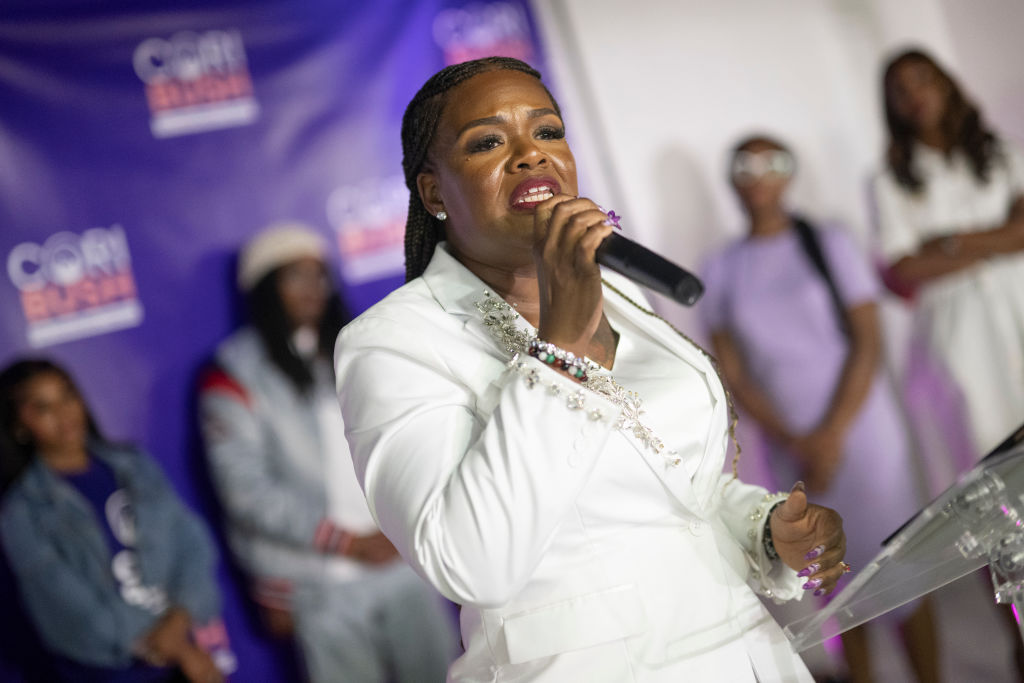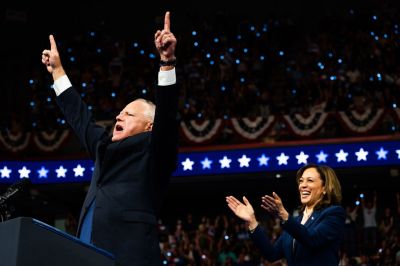Happy Wednesday! For those who were waiting, former President Donald Trump appears to have coined a new nickname for Vice President Kamala Harris, referring to her as “Kamabla” in multiple Truth Social posts this week. No word yet on what exactly the heck Trump means by this. By the way, more than seven years later we’re still standing by for word on what “covfefe” means.
Up to Speed
- In the initial 24 hours after Vice President Kamala Harris unveiled Minnesota Gov. Tim Walz as her 2024 running mate, her White House campaign raised $36 million, a spokesman confirmed to Dispatch Politics Wednesday afternoon.
- Harris’ poll numbers are on the rise, with the latest Marist poll showing her leading former President Donald Trump 51 percent to 48 percent nationally. The trend is similar in battleground states. According to a recent CBS News/YouGov poll, Trump and Harris are tied in Michigan, Pennsylvania, and Arizona. Trump is still ahead in Wisconsin by 1 point and in Georgia and North Carolina by 3 points, but trails Harris by 2 points in Nevada. Harris now leads Trump in the RealClearPolitics average of national polls by half a percentage point, 47.4 percent to 46.9 percent.
- Sen. J.D. Vance of Ohio, the Republican vice presidential nominee, said Tuesday Harris “is running a basement campaign,” criticizing the Democratic nominee for not holding press conferences or sitting for interviews. Harris has had minimal interactions with journalists since her White House bid launched July 21. “I think that you guys have got to do a better job at actually forcing Kamala Harris to answer questions,” Vance said to reporters. “She’s taking a basement strategy of running from reporters instead of getting in front of them, answering tough questions about her record, and letting the American people know who she is.”
- Trump participated in an interview with controversial online streamer Adin Ross on Monday. At its peak, the livestreamed interview amassed more than 580,000 viewers. It is part of a broader campaign strategy to reach young voters, especially young male voters. “Alternative media is certainly part of our strategy, right? Because we understand that there is this massive audience in these alternative platforms outside of the mainstream media, and President Trump is willing to do it,” Trump campaign spokeswoman Karoline Leavitt said on The Benny Show. The interview comes less than a week after Vance appeared on the Full Send Podcast, a show hosted by a group of YouTube influencers and pranksters called the Nelk Boys.
- The Georgia State Election Board voted to allow county election officials to conduct inquiries into whether an election is accurate before they certify the election results. It provides local officials in Georgia with greater power over the election process, potentially a harbinger for challenges to the presidential contest in November. “They’re a mess,” Georgia Secretary of State Brad Raffensperger said about the board in July. Trump, in his rally over the weekend, praised three state election board members for being “pitbulls fighting for honesty, transparency, and victory.”
- FBI agents seized the mobile phone of Tennessee Rep. Andy Ogles amid accusations of fraudulent campaign finance discrepancies. “It has been widely reported for months that my campaign made mistakes in our initial financial filings,” the Republican said Tuesday in a statement on X. “Last Friday, the FBI took possession of my cell phone. It is my understanding that they are investigating the same well-known facts surrounding these filings. I will of course fully cooperate with them, just as I have with the Federal Election Commission.” Despite the ongoing controversy, Ogles won his congressional primary last week.
Democratic Operatives Say They’re High on Tim Walz

The energy was palpable inside Philadelphia’s Liacouras Center Tuesday evening.
As our colleagues reported for The Morning Dispatch, the more than 10,000 grassroots Democrats who packed the arena enthusiastically embraced Minnesota Gov. Tim Walz as Vice President Kamala Harris introduced her freshly minted 2024 running mate. But is this a winning White House ticket?
Veteran, battle-hardened Democratic campaign strategists think so.
Perhaps surprisingly, they have been telling Dispatch Politics since news of Walz’s selection emerged that the folksy Midwesterner, 60, is a better fit for Harris and offers more political upside than Pennsylvania Gov. Josh Shapiro, 51, a rising star in the party who is electrifying on the stump. Shapiro is popular across the political spectrum in his home state, possibly the most pivotal swing state in November. A strong supporter of Israel and himself Jewish, Shapiro might have inoculated Harris from concerns, even among some Jewish Democrats, that her commitment to Israel is softer than President Joe Biden’s.
But a Harris-Shapiro ticket, Democratic operatives say, would have paired two coastal lawyers—Harris from San Francisco, Shapiro from Philadelphia—undermining the campaign against Republican nominee and former President Donald Trump and his running mate, Ohio Sen. J.D. Vance, in virtually every critical battleground state outside of Pennsylvania. And with Walz’s pro-Israel voting record during his 12 years in Congress, and the fact that Harris’ husband is Jewish, Democrats are confident accusations Shapiro was spurned because of growing antisemitism on the left won’t take hold with voters.
“Walz isn’t coastal. He’s a former state champion high school football coach, veteran, and regular guy who can handle a rifle and a rod,” Democratic strategist Dane Strother said. “He will contrast well against the vile nastiness of Trump and slick Vance. Walz knows you don’t put cast iron in the dishwasher or throw out the bacon grease.”
Before running for Congress in 2006 and eventually being elected governor, Walz taught high school social studies and coached football.
“I think you take the midwestern teacher over the East Coast attorney every time,” added a Democratic operative in Washington, who, like many of the roughly dozen party strategists we spoke to, requested anonymity to speak candidly.
They believe Harris’ choice of Walz over Shapiro also satisfied a political priority that accompanies every running mate selection, and that is to “do no harm.” Shapiro was appealing because of demonstrated ability to win over swing voters and disaffected Republicans. But some liberal stakeholders worried he was insufficiently progressive on key issues. In 2022, Shapiro campaigned on school choice, a GOP priority. Walz was warmly received across competing factions of the Democratic Party, with praise coming from both staunch progressive Rep. Alexandria Ocasio Cortez of New York and ardent centrist Sen. Joe Manchin of West Virginia.
“He seemed to be Goldilocks. No one was really objecting to him,” a Democratic official said, referring to the presumptive Democratic vice presidential nominee. “Why go with an option that upsets a few people when there’s an option that upsets no one.”
This broad assessment by Democratic insiders might shock Republicans.
They feared Harris would pick Shapiro, worrying his potential to lure swing voters who lean conservative and soft Republicans who don’t want to vote for Trump would make Harris unstoppable. Walz communicates like the average red state working class dude, but on key policy issues he is a liberal stalwart and enters the presidential race with vulnerabilities generated by his record as Minnesota’s chief executive.
In 2020, Minneapolis was ground zero for the urban riots that broke out across the country in the aftermath of the police killing of George Floyd, and Walz has been criticized for mismanaging the early days of that crisis. Legislation he has signed into law include bills granting Minnesota driver’s licenses to illegal immigrants, allowing convicted felons to vote, and expanding access to gender-transition health care services. Minnesota also has been plagued by a number of scandals related to fraud and mismanagement during Walz’s nearly six years as governor.
With Walz, Trump and his allies believe they can run with a familiar playbook—the one they had planned for—against Harris: that whatever misgivings voters have about the former president and Vance, she is too liberal and incompetent to be trusted in the White House. To boot, Republicans are using the Walz pick as an opportunity to amplify charges that Shapiro didn’t get the nod because some quarters of the Democratic Party are antisemitic. Indeed, after Harris unveiled Walz as the presumptive Democratic vice presidential nominee, Trump posted this simple message on Truth Social: “THANK YOU!”
But outside of some disappointed Democratic operatives in Pennsylvania, who believe the party is making a mistake, the consensus so far from strategists whose only interest is defeating Trump has been broadly positive.
“Walz has a compelling biography—a veteran, a teacher, and a former football coach—that can help Democrats reconnect with the working class,” said Ed Espinoza, a Democratic operative in Texas. “He’s got progressive values but with a moderate tone, making for an overall strong addition to the ticket.”
Another ‘Squad’ Member Goes Down in a Primary

After a July with few primary elections, we had a spate of consequential intraparty contests Tuesday. Bottom line: It was a good night for supporters of Israel.
St. Louis County prosecutor Wesley Bell defeated “Squad” member, Rep. Cori Bush, by nearly 6 percentage points in the Democratic primary for Missouri’s 1st Congressional District. Bush—who called for a ceasefire and an end to American support to Israel the same day Hamas terrorists launched their October 7 attack—was one of multiple progressive critics of the Jewish state to face a well-funded primary challenger this cycle, and she was the second to lose.
The first was New York Rep. Jamaal Bowman, who lost handily to Westchester County Executive George Latimer on June 25. As in that race, the major story in the Bush-Bell battle was groups affiliated with the American Israel Public Affairs Committee (AIPAC) spending millions to support the pro-Israel challenger. Although Bell and Bush did not spend much time debating over Israel, groups aligned with the committee spent about $9 million to help Bell. All told, the two sides spent more than $18 million, the lion’s share being for Bell, making it one of the most expensive primaries in American history.
Like Bowman, Bush attempted to cast the race as big money interest groups trying to buy a House seat. But while Bowman was putting up lackluster polling numbers before AIPAC began spending in his primary in New York, Bush’s reelection bid in Missouri was more complicated. Democratic Majority for Israel founder Mark Mellman told the Jewish Telegraphic Agency that he had polling showing Bell losing to Bush by double digits in January. But in February, a poll from the Missouri Scout had Bell winning by more than 20 points. Both surveys were conducted before any formal actions from AIPAC or its allies.
But in June and July—after the spending started—polls showed Bell even with Bush, foreshadowing his win on Tuesday.
Statewide, Missouri Lt. Gov. Mike Kehoe emerged victorious in the state’s gubernatorial primary. Kehoe, who billed himself as a traditional “common sense” conservative, defeated second-place finisher, state Sen. Bill Eigel, who pledged to “confront the swamp,” and third-place finisher, Secretary of State Jay Ashcroft, the son of former Gov. and U.S. Attorney General John Ashcroft. Former President Donald Trump endorsed all three candidates.
In Michigan, Rep. Shri Thanedar, a quirky freshman who stood strongly in support of Israel after October 7, defeated by more than 20 points Detroit City Councilwoman Mary Waters, an anti-Israel challenger who received notable local endorsements in the Democratic primary for Michigan’s 13th Congressional District. Waters and her supporters generally claimed Thanedar failed to deliver for his district but did not make foreign policy a central issue of the race—and Waters seemed to have little knowledge on the subject. Last week, she was unable to answer basic questions from Dispatch Politics about her views on defense and would not discuss her policy positions on national security beyond cutting aid to Israel and reducing the Pentagon’s budget.
Elsewhere in Michigan, Paul Hudson beat Michael Markey in the Republican primary in Michigan’s 3rd Congressional District and will face freshman Rep. Hillary Scholten, whom the National Republican Congressional Committee has targeted this cycle. Both Hudson, who promised “common sense for crazy times,” and Markey, who ran a more grassroots campaign, affirmed the legitimacy of the 2020 election. In that regard, they stood in contrast to the district’s 2022 nominee, John Gibbs, a Trump-endorsed “Stop the Steal” challenger who lost to Scholten last cycle.
In the primaries for the state’s open Senate seat, former Rep. Mike Rogers and incumbent Rep. Elissa Slotkin easily won their Republican and Democratic primaries, respectively, setting up the general election matchup most observers expected.
Out west in Washington, where the top two vote-getters in the state’s jungle primary advance to the general election, there were also some notable contests. The primary for the state’s 3rd Congressional District saw the Trump-endorsed Joe Kent—another MAGA-aligned candidate who ousted Republican Rep. Jaime Herrera-Beutler in 2022 and lost to freshman Democrat Rep. Marie Gluesenkamp Perez in the general election—advance easily, setting up a November rematch with Perez, who also moved on to the general election.
In the state’s gubernatorial race, former Rep. Dave Reichert, a Republican, and Democratic Attorney General Bob Ferguson advanced to the general election. Though it was clear Reichert would be Ferguson’s opponent in November, the state Republican Party voted to endorse outsider Semi Bird, who had practically no campaign infrastructure when he received the party’s backing. On Tuesday he got 9.4 percent of the vote to Reichert’s 27.9 percent and Ferguson’s 45.5 percent.
Notable and Quotable
“AIPAC, I’m coming to tear your kingdom down.”
—Rep. Cori Bush after losing her primary, August 6, 2024








Please note that we at The Dispatch hold ourselves, our work, and our commenters to a higher standard than other places on the internet. We welcome comments that foster genuine debate or discussion—including comments critical of us or our work—but responses that include ad hominem attacks on fellow Dispatch members or are intended to stoke fear and anger may be moderated.
With your membership, you only have the ability to comment on The Morning Dispatch articles. Consider upgrading to join the conversation everywhere.